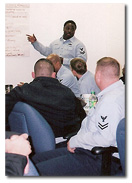ISFS at work...
Assisting leaders in meeting today's socio-financial challenges....
Evaluation of Personal Financial Risk Management (PFRM)
A program created under a
MARMC personal financial education initiative
Prepared for:
- Mid-Atlantic Regional Maintenance Center (MARMC), United States Navy, Norfolk, VA
- Child & Family Services of Eastern Virginia, Norfolk, VA
- Fleet & Family Support Centers of Hampton Roads, Norfolk, VA
I. Findings and Recommendations
The Institute for Socio-Financial Studies (ISFS) is pleased to provide this report to the Commanding Officer Mid-Atlantic Regional Maintenance Center (MARMC), Norfolk, VA, the Child & Family Services of Eastern Virginia (CFS), Fleet & Family Support Centers of Hampton Roads (FFSC), and other interested parties.
MARMC is a shore-based industrial activity responsible for planning, tracking, and accomplishing the repair and alteration of Navy ships stationed within the Mid-Atlantic Region. The MARMC personal financial education initiative was instigated at the request of the former Command Master Chief, Steven R. Ketchum, who sought the development of a command based, non-traditional, personal finance training program in order to:
(1) Reduce the incidences and the potential serious consequencesof financial problems being experienced by MARMC enlisted personnel and their families, described as:
- Decreased operational readiness and retention
- Deteriorating job performance and time away from work
- Increased family violence
- Increased substance abuse
- Crime and incarceration
- Safety issues and accidents
- Possible factor in suicides
(2) Lessen the following significant administrative costs and burdens on the MARMC command due to financial problems of enlisted personnel:
- Letters of Indebtedness
- Pay adjustments and garnishments
- Security clearance changes and reassignments
- Administrative separations
In response, a pilot program entitled “Personal Financial Risk Management” (PFRM) was created to elevate the financial literacy of the MARMC mid-level enlisted personnel (E-4 to E-6). The pilot program was undertaken by a team of financial educators from CFS, FFSC, and Invited Special Educators (ISE). It continues to receive the full support of Command Master Chief, Ronald P. "Ron" Bennett.
 PFRM is a collaborative design incorporating an existing personal
financial management program with new interactive adult training and
coaching techniques that were refined following a meeting of command
principals and community educators. The targeted trainees were mid-level
petty officers (primarily E-4 to E-6), having a need or desire for
remedial and/or preventive personal financial education. It is anticipated
that after taking the financial training, these petty officers would
be able to improve their own financial management and help junior Sailors
who report to them. In this manner, it was anticipated that PFRM would
have some beneficial “trickle down effect.”
PFRM is a collaborative design incorporating an existing personal
financial management program with new interactive adult training and
coaching techniques that were refined following a meeting of command
principals and community educators. The targeted trainees were mid-level
petty officers (primarily E-4 to E-6), having a need or desire for
remedial and/or preventive personal financial education. It is anticipated
that after taking the financial training, these petty officers would
be able to improve their own financial management and help junior Sailors
who report to them. In this manner, it was anticipated that PFRM would
have some beneficial “trickle down effect.”
The subject of this evaluation is the 2 ½ day “hands on” workshop, the Personal Finance Risk Management Workshop that was conceived and created to address the concerns raised by the MARMC command. The workshop was conducted March 14-16, 2006 and a focus group interview of 10 participants in the workshop was conducted on June 8, 2006.
Principal findings of the evaluation follow:
- PFRM is a very well conceived and professionally delivered “hands on” training program. The March 14-16 workshop satisfied all of the Seven Dimensions of Effective Personal Financial Education and qualifies as an effective and replicable financial management education program.
- The safety and well-being of MARMC enlisted personnel and family members at all levels who are experiencing financial difficulty are potentially at serious personal risk without financial education resources such as PFRM.
- An analysis of focus group results conducted by ISFS in June, 2006 determined that participants who attended the March 14-16, 2006 PFRM experienced cognitive changes and/or improved their knowledge and (possibly) their financial condition as a result of the training.
- One immediate “trickle down” effect is the recommendation by former workshop participants to younger Sailors that they attend a PFRM workshop.
- A nearly-unanimous recommendation among class participants (and by focus group members subsequently) is that at least part of the training should be made available to young Sailors at time of recruitment.
- The PFRM workshop, buttressed by DoD, Navy, and other web-based financial instruction, can be a crucial training tool for the MARMC command, especially if it is more widely marketed (and attendance made obligatory for Sailors experiencing financial difficulty.)
- Administrative burdens caused by the financial difficulties of Sailors are extremely costly to the MARMC command in both human and financial terms. Antiquated personnel policies given today’s consumer credit culture, and the administrative procedures in place to implement them, arguably benefit creditors, not the Navy.
- Effects of PFRM on lessening the administrative burdens of the MARMC command due to “financial mishaps” of enlisted personnel are not known, since long-term measures must first be created to track them.
Our recommendations follow:
- We encourage MARMC to establish the PFRM Workshop as a permanent, regularly scheduled, command-based personal financial training program. For Sailors who are known by the command to be experiencing financial difficulty, obligatory attendance at a PFRM Workshop is recommended.
- We suggest that PFRM managers incorporate into the program an evaluation framework that tests financial knowledge and skills before and after training and, to the extent possible, assesses financial behaviors and well-being over time.
- We suggest that the PFRM curriculum also include a session that directs participants to, and prepares them to use, the abundant electronic resources created by the DoD, the U.S. Navy, and other organizations that offer assistance to service members online.
 The following human, operational, and administrative conditions
were linked by the MARMC Command to Sailors’ financial difficulties. Most
also were mentioned independently by focus group members. We
believe that measures are urgently needed that track and assess the
effects of personal financial difficulties on incidences of:
The following human, operational, and administrative conditions
were linked by the MARMC Command to Sailors’ financial difficulties. Most
also were mentioned independently by focus group members. We
believe that measures are urgently needed that track and assess the
effects of personal financial difficulties on incidences of:
- Family violence
- Substance abuse
- Crime and incarceration
- Possible cause in suicides
- Safety issues and accidents
- Reduced operational readiness and retention
- Poor job performance and absenteeism
- Significant administrative time/money lost to the processing of:
- Letters of Indebtedness
- Pay adjustments and garnishments
- Security clearance changes and reassignments
- Administrative separations
 Although PFRM Program performance measures are reliable,
program effectiveness metrics are needed to determine the
extent to which the program leads to the improvement of Sailors’ financial
well being and to the lessening of other serious “financial
mishaps” at the MARMC command.
Although PFRM Program performance measures are reliable,
program effectiveness metrics are needed to determine the
extent to which the program leads to the improvement of Sailors’ financial
well being and to the lessening of other serious “financial
mishaps” at the MARMC command.
- We suggest that administrative procedures regarding Letters of Indebtedness be eliminated and that all future letters be returned to creditors. Creditors should be advised that the U.S. Military no longer processes this type of correspondence and that creditors must go through standard civilian channels to collect debts.
- We believe that all personal credit and debt policies that place unnecessary administrative costs and burdens on MARMC and the Navy should be reviewed and strategically updated to reflect the realities inherent in today’s consumer credit society. Comprehensive credit reports, for example, offer a more accurate picture of Sailors’ financial and security risks than Letters of Indebtedness.
- We believe that modernization of administrative procedures associated with the financial problems of service members would result in large cost savings for the Navy, and that the savings realized could be used to fund (and evaluate) financial education and counseling programs for service members and their families.
A more detailed discussion about the links between the financial problems of Sailors and the burdens they place upon the MARMC command will be found in Section VIII of this report.
For more infomation about this report, please contact Lois A. Vitt directly through the ISFS offices.
_________________________________________________________________
ISFS conducts benchmark studies, evaluation research, policy research, and financial education research for corporations and other organizations. It performs feasibility, business, startup and strategic planning that promotes social entrepreneurship in the area of consumer financial education, health finances education, and financial planning. It has created the concept of "Mattering in Health Care" as a means of measuring whether and how much people feel valued by their employers, health care providers, HMOs and the insurers they patronize as consumers.
Through its research, cooperative programs, and The Middleburg Institute, ISFS assists leaders in business, academia and the public sector in meeting today's socio-financial challenges. Since its inception in 1991, ISFS has had a far-reaching impact. The results of ISFS research have been presented in the US, Canada, Europe, Japan, and China, and have been translated into at least three languages. Inter-disciplinary curricula in financial sociology and financial gerontology have been introduced and taught at universities, and a Certificate Program in Financial Gerontology has been created for universities having gerontology institutes and programs.
